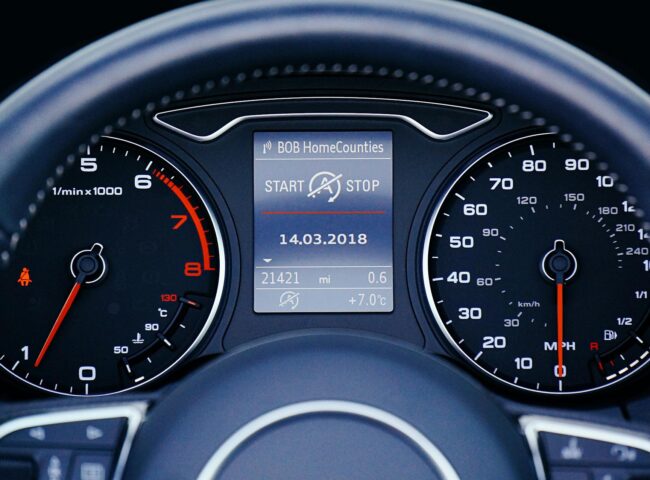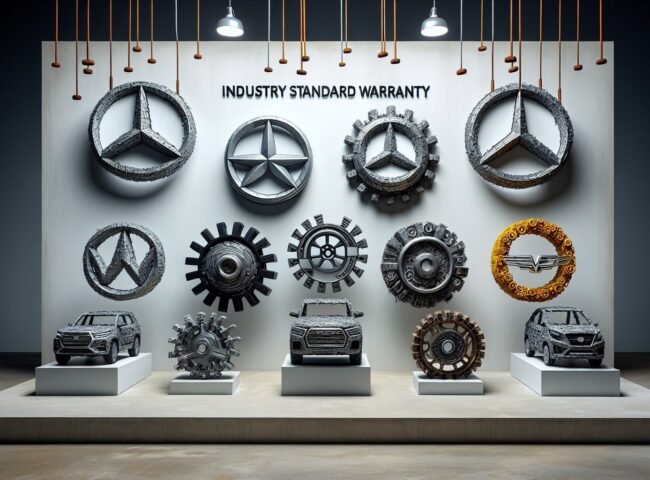Concerned about repair costs for your used car? A warranty used car can safeguard you against unexpected expenses. This article covers the different types of warranties, what they include, and tips on choosing the best one for your vehicle.
Used Car Warranty Overview
- Used car warranties, unlike new car warranties, often cover essential components like the powertrain and do not typically include routine maintenance or preexisting conditions. They provide financial protection against unexpected repairs.
- Checking for an existing manufacturer’s warranty using the VIN is crucial before purchasing a used car, as it can reduce potential costs and provide additional coverage.
- Certified Pre-Owned (CPO) car warranties offer extended protection and peace of mind, with Hyundai, Kia, and Mitsubishi recognized for their superior CPO warranties that include valuable benefits such as roadside assistance.
Understanding Used Car Warranties

Used car warranties, often referred to as vehicle service contracts, are agreements that cover the repair or replacement of certain vehicle parts and systems. These warranties can vary significantly in terms of coverage, duration, and cost, providing peace of mind for vehicle owners as their cars age. Unlike new car warranties, used car warranties might offer less robust coverage options, but they still play a crucial role in protecting against unexpected repair costs.
There are distinct differences between used and new car warranties. Here are some key points to consider:
- New car warranties typically cover a broad range of issues under a bumper-to-bumper warranty.
- Used car warranties might focus more on essential components like the powertrain.
- The cost of these warranties can depend on factors such as the vehicle’s age, mileage, and the level of coverage chosen.
- Generally, used car warranties do not cover routine maintenance, wear-and-tear items, or preexisting conditions.
Grasping the fundamentals of used car warranties is pivotal in facilitating an informed decision. These warranties offer financial protection against unexpected repairs, making them a worthwhile consideration for anyone purchasing a used vehicle. The peace of mind they provide can transform your driving experience, knowing that you’re covered in case of unforeseen issues.
Checking for Existing Manufacturer’s Warranty
Prior to purchasing a used car, it is imperative to verify the existence of an active manufacturer’s warranty. This can significantly affect your decision and potential costs down the line. Start by locating the Vehicle Identification Number (VIN) on the car. This unique identifier is key to accessing the car’s warranty information.
Using the VIN, you can check the car’s warranty status on various VIN decoder websites such as AutoCheck, carVertical, and CARFAX. Additionally, you can create an account on the manufacturer’s website or contact a dealership for assistance. The in-service date, which is when the car was first purchased and driven, is also crucial for warranty verification. Knowing the mileage is another determining factor in figuring out if your vehicle warranty still applies.
After gathering this information, review the coverage details and expiration dates carefully. Contact the manufacturer or dealership to verify the warranty’s accuracy and ensure it’s transferable to you as the new owner. This step is vital because most car warranties transfer from the seller to the buyer but may require notifying the automaker within a specific timeframe.
A detailed investigation of any existing manufacturer’s warranty can spare you unnecessary expenses and enhance coverage on your used car.
Certified Pre-Owned (CPO) Car Warranties

Certified Pre-Owned (CPO) car warranties present a diverse mix of advantages for used car purchasers. Some of these advantages include:
- CPO cars are typically only a few years old
- They have low mileage
- They undergo a rigorous certification process
- They come with a warranty that often extends beyond the original bumper-to-bumper warranty, protecting the vehicle from defects and providing peace of mind to buyers.
Factory-certified pre-owned vehicles have warranty coverage provided and backed by the vehicle’s original manufacturer. These cars are generally sold at franchised new car dealers of the same brand, ensuring that the coverage adheres to stringent standards. The warranty might include extras like roadside assistance and trip interruption reimbursement, which are valuable additions for any car owner.
Hyundai, Kia, and Mitsubishi are reputed for their superior Certified Pre-Owned (CPO) warranties in the industry. These manufacturers provide excellent coverage for buyers seeking assurance in their used vehicle purchase. For instance, Hyundai’s CPO vehicles come with a 10-year or 100,000 miles powertrain warranty and additional benefits like 10-year/unlimited mile roadside assistance. Kia’s CPO warranty includes a 10-year/100,000-mile powertrain warranty and 10-year/unlimited miles roadside assistance. These comprehensive coverage options make CPO warranties an attractive option for those looking for reliability and extended protection in their used car purchase.
Evaluating Extended Car Warranties
Extended car warranties augment coverage beyond the initial manufacturer’s warranty, offering drivers reassurance with comprehensive protection against unforeseen malfunctions or breakdowns. These warranties can be particularly beneficial for older vehicles or those with higher mileage, which are more likely to experience costly repairs. However, extended warranties come with both pros and cons, and it’s important to weigh these carefully before making a decision.
The cost of an extended car warranty typically ranges from $1,000 to $4,000, with additional charges for features like roadside assistance or rental car reimbursement. The cost can depend on factors such as the vehicle’s age, condition, and mileage. While some extended warranties offer extensive coverage, others may have exclusions or limitations on specific repairs and services. Despite these potential drawbacks, 65% of respondents reported satisfaction with their extended warranties.
Contemplation of an extended warranty necessitates a thorough assessment of your vehicle’s requirements and prospective repair expenses. Manufacturer extended warranties, though potentially more expensive, can offer peace of mind and ensure repairs are done at authorized dealerships. On the other hand, aftermarket options might provide more flexible terms and customizable plans. Ultimately, the decision to buy an extended warranty should be based on a thorough analysis of your car’s reliability and your financial readiness to handle unexpected repairs.
Types of Extended Car Warranties

Extended car warranties come in three primary types: manufacturer-backed, dealer-backed, and third-party providers. Each type carries its unique benefits and limitations, hence the importance of selecting the most suitable one according to your specific needs and circumstances.
Manufacturer-backed extended warranties are offered directly by the automaker. These warranties ensure that coverage adheres to the original warranty terms and that service is performed at authorized dealerships. While this can provide peace of mind regarding the quality of repairs, it may also come with higher costs and less flexibility compared to other options.
Dealer-backed warranties are offered by car dealerships and might include specific benefits aligned with the dealership’s service and repair facilities. These warranties can sometimes be more expensive and limited in terms of car warranty coverage, but they often come with perks like rental car coverage and trip interruption services.
Third-party warranties, also known as aftermarket warranty plans, are provided by independent companies such as Endurance and Carchex. These plans cover a range of protection levels and often provide customizable payment options. Third-party providers can offer more flexibility and broader coverage options, making them an attractive choice for many used car owners.
Are Extended Warranties Worth It?
The decision on the worthiness of extended warranties hinges on various factors. One of the main benefits of an extended warranty is the financial protection it offers against expensive out-of-pocket repair costs. This can be particularly reassuring for those who may not have the funds readily available to cover unexpected repairs.
The age and condition of your car play a significant role in this decision. Older vehicles with higher mileage are more likely to experience breakdowns, making an extended warranty a potentially wise investment. Research common issues for your car’s make and model year using resources like RepairPal and Edmunds to estimate repair costs and assess if these costs exceed your comfort level.
However, it’s important to consider that a significant portion of consumers may never use their extended warranties. Before purchasing, evaluate whether you can cover an unexpected $1,000 repair without going into debt. If you find that the security and peace of mind provided by an extended warranty outweigh the costs, then it may be a worthwhile investment for your used car.
Top Extended Car Warranty Companies

In 2024, multiple car warranty provider companies, including used car warranty companies, distinguish themselves with their outstanding extended car warranty offerings. The top extended car warranty companies include Carchex, Endurance, and CarShield, among others. These companies have been selected based on various criteria, including available service contracts, the claims process, and financial backing.
Endurance is rated as the best company for a used car warranty in 2024 according to experts. Other recommended providers include:
- CarShield
- Rapid Auto Protection
- Toco
- Olive
- Concord Auto Protect
Each of these companies offers unique benefits and coverage options, making them worth considering based on your specific needs.
When evaluating these companies, consider factors such as the range of coverage options, customer service quality, and additional benefits like roadside assistance and rental car reimbursement. This can help you choose the best extended car warranty company for your used car.
Endurance
Endurance provides an array of customizable plans catering to diverse needs and budgets, ranging from straightforward powertrain coverage to all-inclusive exclusionary plans. One of the standout features of Endurance is its Highline luxury vehicle protection add-on to the Supreme plan, catering to select luxury vehicle makes.
Endurance also provides a 30-day money-back guarantee and a mandatory waiting period before coverage begins to protect against warranty fraud. Standard benefits included in Endurance plans are 24/7 roadside assistance, trip interruption coverage, and rental car reimbursements. These benefits can significantly enhance the value of the warranty, providing added peace of mind for drivers.
Additionally, Endurance covers a wide range of vehicles, including high-mileage, Canadian Grey Market vehicles, and those with rebuilt titles. The Advantage plan, which includes up to $3,500 in routine maintenance coverage, further sets Endurance apart as a top choice for extended car warranties.
Carchex
Carchex is celebrated for its adaptable warranty plans, providing five levels of coverage to accommodate a variety of customer needs. This flexibility makes it an attractive option for those looking for tailored protection for their used cars.
In addition to its flexible plans, Carchex includes extra services such as towing and rental car reimbursement in their offerings. These benefits, combined with the company’s strong reputation and A+ rating from the BBB, make Carchex a top choice for extended used car warranties.
Rapid Auto Protection
At Rapid Auto Protection, we are committed to providing peace of mind and protection for your valuable investments, from your car to your home. We offer comprehensive extended warranties for a wide range of vehicles, including cars, trucks, SUVs, RVs, powersport vehicles, motorcycles, and even your home.
CarShield
CarShield presents a wide array of plan options spanning from rudimentary powertrain coverage to all-encompassing protection plans encompassing vehicle electronics, air conditioning, among others. This variety allows customers to choose a plan that best fits their needs and budget.
CarShield is particularly known for providing coverage for high mileage vehicles, making it a preferred choice for those with older cars. The plans include perks such as 24/7 roadside assistance, rental car reimbursement, and trip interruption service, and they are easily transferable if the car is sold before the warranty expires.
Alternatives to Used Car Warranties

Despite the valuable protection offered by extended car warranties, they are not the sole option at your disposal. One alternative is setting aside money for potential repairs. By regularly saving a portion of your budget, you can create a financial cushion to cover unexpected repair costs, avoiding the need for a warranty altogether.
Another alternative is Mechanical Breakdown Insurance (MBI), which is often provided by car insurance companies like Geico. MBI can offer similar coverage to extended warranties but may come at a lower cost.
For those who prefer not to own a car long-term, leasing a vehicle can eliminate the need for an extended car warranty altogether. Additionally, certain states have lemon laws that provide consumer protection for used cars, potentially reducing the need for extended warranties.
How to Choose the Right Used Car Warranty
Selecting the appropriate used car warranty entails a number of crucial steps. First, assess your coverage needs based on estimated repair costs and the type of vehicle you own. Resources like Edmunds and RepairPal can provide valuable insights into your car’s reliability and potential repair expenses. This research will help you determine the level of coverage you need and avoid overpaying for unnecessary protection.
Next, it’s essential to get multiple quotes from different providers to ensure you’re getting the best deal. Comparing quotes allows you to evaluate the coverage options, costs, and additional benefits offered by each provider. This process not only helps you find the best value but also gives you negotiating power when shopping around.
Finally, pay close attention to the fine print of each warranty plan. Understanding the terms and conditions, including what is covered, any deductibles, and exclusions, is crucial for making an informed decision. This step ensures that you know exactly what you’re signing up for and can avoid surprises down the road.
Comparing Quotes and Coverage
As you compare quotes and coverage from various providers, it’s advisable to start by collecting several quotes to gauge the market rates. This will help you understand the cost of a used car warranty plan for your specific vehicle. Ensure that each quote includes the same coverage elements for a fair and accurate comparison.
Consider the following when evaluating quotes for a vehicle protection plan:
- The level of coverage provided
- Your budget and what you can afford
- Negotiating options, such as showing competing prices or shopping from a used car dealer
- The possibility of securing a better deal or added benefits at no extra cost
It’s essential to choose a plan that meets your needs without breaking the bank.
Remember that different warranty companies may offer varying rates and coverage options depending on the specific vehicle model. What works best for one car might not be ideal for another, so tailor your search to your vehicle’s unique requirements.
Reading the Fine Print
Thoroughly perusing the fine print of warranty terms and conditions is a key step prior to finalizing a purchase. Carefully review what is covered and what is not, as well as any deductibles and exclusions. Some key points to consider include:
- What components are covered by the warranty
- Any specific exclusions or limitations
- The duration of the warranty
- Any deductibles or fees associated with filing a claim
By understanding the warranty terms and conditions, you can make an informed decision and ensure that you are adequately protected.
Pay attention to the choice of repair facilities allowed under the warranty. Some warranties may restrict you to specific repair shops, which can be inconvenient if you prefer using a trusted local mechanic. Understanding these details will help you avoid unexpected issues when it comes time to use the warranty.
Additionally, when researching warranty providers, it is important to consider their reputation. Here are some steps you can take to ensure you choose a reputable warranty company:
- Check platforms like the Better Business Bureau (BBB) and Trustpilot for reviews and ratings of the provider.
- Look for a provider with a track record of excellent customer service.
- Ensure the provider has reliable claims processing.
Taking these steps can save you from potential headaches and give you peace of mind when choosing a warranty company.
Additional Considerations
In the process of selecting a used car warranty, there are a few more considerations that warrant attention. The cost of used car warranties can range from $1,500 to $4,000, with monthly payments typically between $100 and $200. Factors such as:
- vehicle type
- provider
- length
- level of coverage
can all affect the pricing.
The claims process is another critical factor. Look for companies known for reliably paying out claims and providing prompt service. According to surveys, about 41% of respondents said the claims process typically took two to three days, while only 12% said the process took a single day. Customers are often concerned about whether their repairs will be covered and the exclusions in the warranty.
Finally, when purchasing a used car warranty, pay attention to the following factors:
- The coverage period and what is included in the warranty
- The deductible amount and how it is applied
- The reputation and reliability of the warranty provider
- The cancellation terms and any fees involved
Understanding these details will help you avoid unexpected costs if you need to cancel the warranty. By considering these additional factors, you can ensure you get the best value and avoid common pitfalls associated with used car warranties.
Summary
In summary, understanding and evaluating used car warranties can provide significant peace of mind and financial protection against unexpected repairs. From checking for existing manufacturer warranties to exploring Certified Pre-Owned (CPO) options and evaluating extended warranties, there are numerous ways to ensure your used car is protected.
Top extended car warranty companies like Endurance, Carchex, and CarShield offer a range of plans and benefits that cater to different needs and budgets. By comparing quotes, reading the fine print, and considering additional factors like cost and claims process, you can choose the right warranty provider for your vehicle.
Ultimately, the right warranty can save you money and stress, allowing you to enjoy your used car with confidence. Make an informed decision based on your specific needs and circumstances, and you’ll be well-equipped to handle whatever the road ahead may bring.
Frequently Asked Questions
How can I check if a used car still has an active manufacturer’s warranty?
You can check a used car’s manufacturer’s warranty status by using the Vehicle Identification Number (VIN) on websites like AutoCheck, carVertical, and CARFAX, or by contacting the manufacturer or a dealership for assistance.
What are the benefits of Certified Pre-Owned (CPO) car warranties?
CPO car warranties offer extended coverage and extras like roadside assistance and trip interruption reimbursement, providing peace of mind and protection against potential defects.
Are extended car warranties worth the investment?
Extended car warranties can be worth the investment, especially for older or high-mileage vehicles, as they provide financial protection against expensive repairs and offer peace of mind.
What should I consider when choosing an extended car warranty provider?
Consider the range of coverage options, customer service quality, additional benefits like roadside assistance, and the company’s reputation when choosing an extended car warranty provider. Comparing quotes and reading the fine print is also essential.
What are some alternatives to purchasing an extended car warranty?
Consider setting aside money for potential repairs, opting for Mechanical Breakdown Insurance (MBI), leasing a vehicle instead of buying, or exploring lemon laws in certain states to protect against potential car issues. Investing in these options can provide financial security and peace of mind when it comes to car maintenance.





